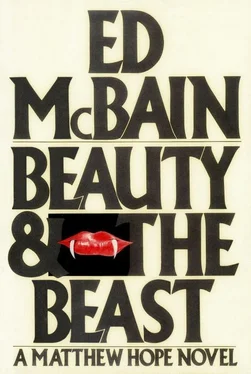“Benny—”
“I’ve also made it a policy never to defend a person I don’t like, even if I believe he’s innocent. I don’t particularly like George N. Harper, don’t ask me why. Therefore, ever grateful for the opportunity to get out of bed in the middle of the night and to go downtown without a shave, I must nonetheless decline your offer to represent Mr. Harper in this case.”
“Benny, he needs a good lawyer,” I said.
“You’re a good lawyer, Matthew.”
“I know very little about criminal law.”
“Then let the public defender handle it.”
“I think he’s innocent.”
“The Public Defender’s Office,” Benny said drily, “has also been known to believe in the innocence of an accused party.”
“That’s not the point. I know they’ve got some very good people up there, and I personally like Dick Jorgenson, but — damn it, Benny, they’ve got so many cases to handle, I’m afraid he’ll get lost in the shuffle.”
“Then defend him yourself,” Benny said simply.
“I wouldn’t know where to begin.”
“Begin where the state’s attorney will begin,” Benny said, and stubbed out his cigarette. “He’s going to be building a case to prove beyond reasonable doubt that Harper did, in fact, murder his wife. He’s going to assemble whatever he can to show Harper had the means, the motive, and the opportunity. I don’t know when this thing will come to trial, the docket’s jammed right now, it might not be till early next year. So you’ll have plenty of time to assemble facts that will show he did not have the means, the motive, or the opportunity. If you believe he’s innocent, that’s what you’ll have to show, Matthew. And you’ll have to show it convincingly enough to keep your man out of the electric chair.”
“I don’t know if I can do that.”
“Then maybe you don’t believe in his innocence strongly enough.”
“I think I do, Benny.”
“Then take the case. Convince the jury.”
“You won’t help me?”
“I think he’s guilty,” Benny said simply, and put another cigarette in his mouth.
There were several very good reasons why I should not have undertaken the defense of George N. Harper.
To begin with, I was not a criminal lawyer, and I felt I might be doing him more harm than good. Section 782.04 of the F.S. reads: “The unlawful killing of a human being, when perpetrated from a premeditated design to effect the death of the person killed... shall be murder in the first degree and shall constitute a capital felony, punishable as provided in s. 775.02.” The section defining the penalty referred to yet another section titled “Findings in Support of Sentence of Death,” and listing “aggravating circumstances” as one such supportive finding. Under a subheading that read “Aggravating circumstances shall be limited to the following,” there was a list that included “The capital felony was especially heinous, atrocious, or cruel,” and lastly, “The capital felony was a homicide and was committed in a cold, calculated, and premeditated manner without any pretense of moral or legal justification.”
If the state’s attorney could prove that Harper had, in fact, bound his wife’s hands and feet with wire hangers before dousing her with gasoline and setting fire to her, there could be no question that the crime had been “cold, calculated, and premeditated,” and that it had also been “especially heinous, atrocious, or cruel.” Harper was facing death in the electric chair, and whereas he had specifically asked me to represent him, I wondered now if the better part of valor would not be to make a request to the court for an attorney more experienced in such matters.
Secondly, like Benny Weiss, I did not particularly like Harper. I tried to understand this unreasoning antipathy to the man. Was it caused by a lingering prejudice, the aftermath of a Chicago childhood that separated blacks and whites as effectively as a barbed-wire fence? I did not think so. I learned my first lesson in tolerance when I was seventeen and avidly chasing girls of any persuasion, color, or stripe. There was a gloriously beautiful black girl in my high-school English class, and I took her to the movies one night, and for ice-cream sodas later, and then led her into my father’s multipurpose Oldsmobile, and drove to a deserted stretch of road near the football field, and plied her with kisses and my ever-reliable “I love you” (her name was Ophelia Blair, “I love you, Ophelia,” my hand fumbling under her skirt), and then pleaded that she let me “do” it because I’d never in my life “done” it with a black girl.
Never mind that I’d never done it with a white girl, either. That was my supreme argument: she was black and I was white, and oh what a glorious adventure awaited us if only she’d allow me to lower her panties and spread her legs, a latter-day Stanley exploring Africa. It never occurred to me that I was reducing her to anonymity, denying her very Ophelianess, equating her with any other black girl in the world, expressing desire for her only because she was black and not merely herself , whoever that might have been, the person I had not taken the slightest amount of trouble to learn. I was baffled when she pulled down her skirt and tucked her breasts back into her brassiere, and buttoned her blouse, and asked me very softly to take her home, please. I asked her out a dozen times after that, and she always refused politely. I was learning. I have learned well over the years. I may not be color-blind (that would be too much to expect of any white man) but neither do I ever base my personal response to any man or woman on an accidental, at best, tinting of the flesh, preferring instead to seek out the person within the shell.
So why didn’t I like George N. Harper?
Maybe it was because he was so damn ugly. I have never won any beauty contests myself, but the size of Harper, the intimidating hulk of him, the gorilla-like slouch of him, the menace — yes, menace — inherent in his eyes and in his stance and in the huge hands that dangled at the ends of his powerful arms, the sheer primeval power of him, the frightening look of him caused me to back involuntarily away from him whenever we were in the same room together, as though I were convinced that he was capable of committing against me the very crime he’d been accused of committing against his wife. And yet if the color of his skin didn’t matter to me, then why should his physical appearance have constituted a handicap? Did due process apply only to the beautiful people in the world? Wasn’t Harper entitled to the same fair and honorable defense Robert Redford might have enjoyed? Or did I secretly believe he was guilty, and was I looking for excuses to avoid advocating his cause, depriving him beforehand of his life or liberty without benefit of the due process required by the laws of the land? No, he was innocent. I knew it with every fiber in my body. He was innocent , damn it. I should defend him, I would defend him.
But there was yet another reason why I should have told him no. Discounting my inexperience, discounting my aversion to the man, discounting even the selfishness of the last reason, it remained nonetheless a true and valid reason for begging off.
I had planned a vacation.
Selfish, yes, I admit it.
Or perhaps not quite so selfish when one considers that Dale had planned her own vacation for the same period of time, or that both our vacations coincided with Joanna’s Thanksgiving break, when all three of us planned to go to Mexico together.
We had been working on the trip for months, consulting the best travel agent in Calusa (no great shakes, but really the only game in town), and were scheduled to leave for Puerto Vallarta nine days from now, on Friday, November 27, to spend almost four days as guests of Samuel Thorn, a retired Calusa Circuit Court judge, in a villa he’d owned for the past year, after which we planned to go to Mexico City, flying back home again on Saturday, December 5. True enough, this would only be nine days. And assuming, as Benny had guessed, that we would not be coming to trial till after the new year, nine days of preparation would not be sorely missed.
Читать дальше












